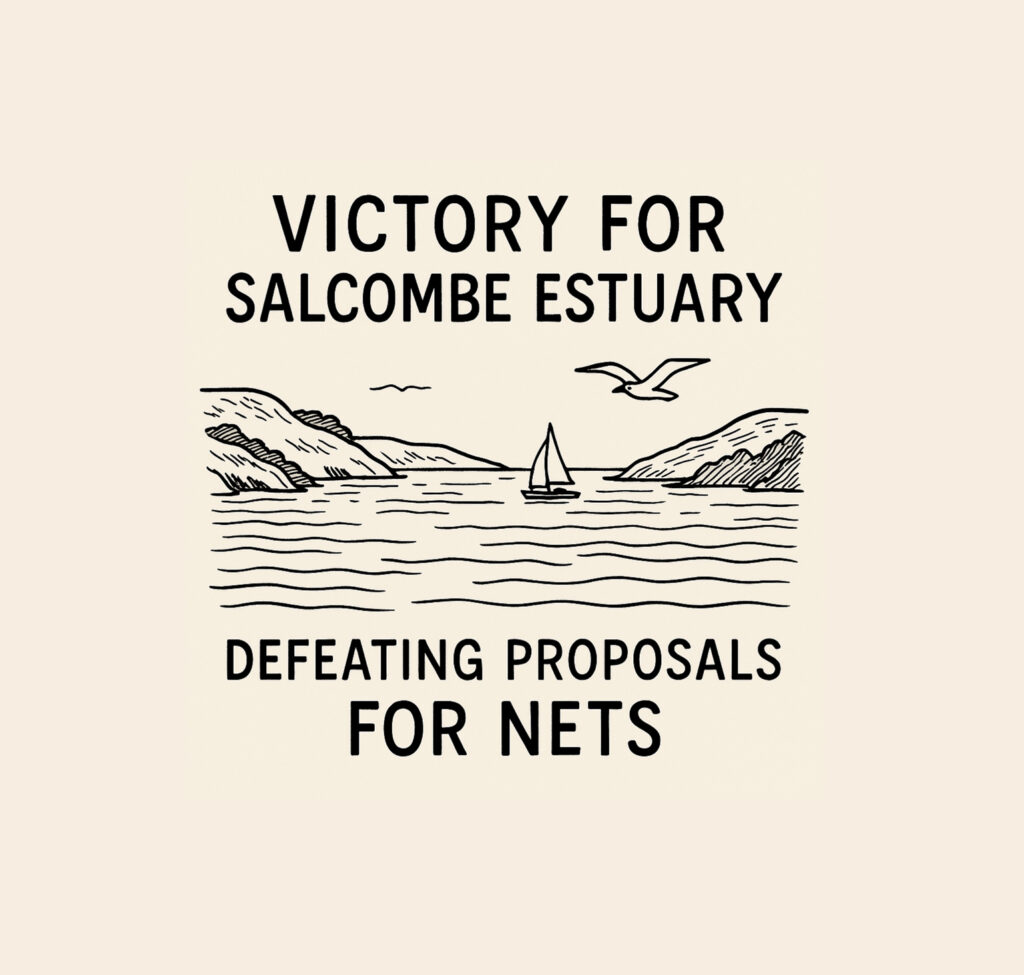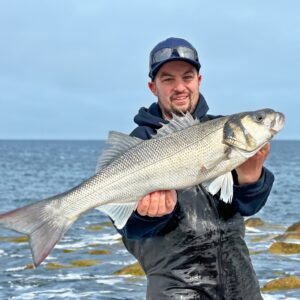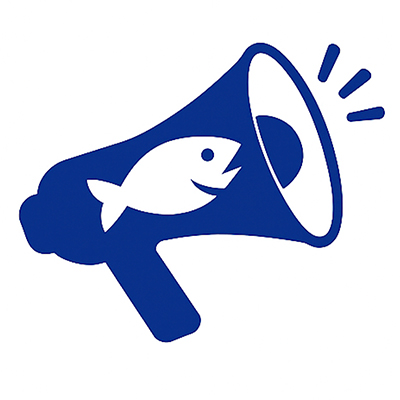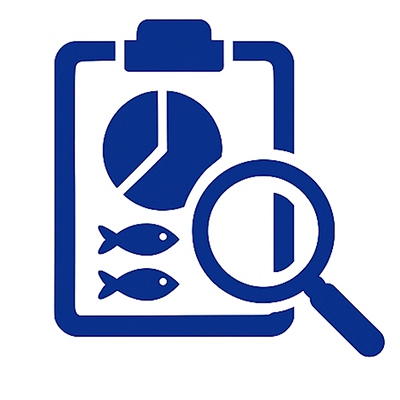Salcombe Harbour remains net-free to this day, thanks to a passionate campaign led by the Angling Trust and its then Sea Angling Engagement Manager, Grant Jones, now the lead consultant at YourAnglingVoice.
In late 2023, a proposal emerged to allow commercial fixed-net fishing in the Salcombe Estuary (a designated Bass Nursery Area and Site of Special Scientific Interest) for six months each year. But an unprecedented wave of public opposition – the largest ever response to a Devon & Severn IFCA consultation – defeated the proposal, protecting the estuary’s rich marine life and its value to anglers and the community (anglingtrust.net). “There will be no net fishery within Salcombe Estuary!” came the celebratory news – a hard-won outcome achieved after months of tireless campaigning (henry-gilbey.com).
Grant Jones Leads the Charge
From the start, Grant Jones of the Angling Trust spearheaded the fight against the netting plan. As the Trust’s Sea Angling Engagement Manager, Jones coordinated a collaborative working group to craft a powerful, evidence-based case against the proposal (anglingtrust.net). He spent months engaging hundreds of individual anglers and every imaginable organisation with an interest in the estuary – from local clubs to national conservation bodies (anglingtrust.net). Jones even represented anglers at the decisive IFCA meeting on 22 February 2024, alongside volunteers from the Angling Trust’s South West (Wyvern) region (henry-gilbey.com). His leadership did not go unnoticed. Following the victory, the Wyvern Sea Angling community praised “an amazing bit of work led by Grant Jones and all at the [Angling Trust]” (henry-gilbey.com). The Bass Anglers’ Sportfishing Society (BASS) likewise credited Jones’ central role, writing: “BASS was delighted to hear the news this week, and wishes to pass on our thanks to all at the Angling Trust led by Grant Jones… especially the individuals who contributed to the campaign against this crazy proposal.” (facebook.com) Such accolades underscore how pivotal Jones and the Angling Trust were in mobilising opposition.
A Coalition of Anglers, Conservationists, and Community Stakeholders
The campaign’s strength came from its broad coalition of supporters. Anglers were united – from local sea angling clubs to specialist groups like BASS and the National Mullet Club (NMC). The Angling Trust formed a working group “led by Grant Jones” that brought together its Wyvern regional volunteers alongside BASS and NMC representatives (anglingtrust.net). But it didn’t stop with the angling community:
-
Conservation and Wildlife Organizations: Environmental NGOs and marine wildlife charities rallied to the cause. Notably, Devon Wildlife Trust, multiple marine mammal conservation groups (focused on seals, dolphins and porpoises), and local environmental organizations submitted strong objections (anglingtrust.net). They warned that netting would risk unacceptable bycatch of non-target species, threatening birds, seals and cetaceans in the estuary (bbc.com). The estuary’s seagrass meadows and sensitive habitats – critical for juvenile fish – were also flagged for protection.
-
Habitat Researchers and Restoration Projects: Academic and conservation projects lent their weight. Marine scientists from Plymouth University engaged in the consultation (anglingtrust.net), reflecting concern for the estuary’s ecological health (Salcombe’s waters host valuable seagrass beds and nurseries for bass and other species). Seagrass restoration advocates and habitat conservation initiatives likewise supported maintaining the netting ban to safeguard biodiversity.
-
Local Authorities and Regulators: Natural England (which now occupies a statutory seat on the IFCA) formally objected to lifting the ban (anglingtrust.net). South Hams District Council and Kingsbridge Town Council (the local governments) also weighed in against the plan (anglingtrust.net). The Salcombe Harbour Authority – responsible for managing the estuary – joined the opposition as well (anglingtrust.net). Even within the IFCA, officers were clearly uneasy with the proposal’s risks; in fact, Devon & Severn IFCA’s Chief Officer, Mat Mander, ultimately recommended rejection, citing conflicts with conservation objectives and fisheries law (anglingtrust.net).
-
Tourism and Business Community: Salcombe is a popular tourist destination and sailing hub, and its economy benefits hugely from a healthy marine environment. Local businesses and the tourism sector voiced support for keeping the estuary net-free (anglingtrust.net). They recognized that the estuary’s wildlife and angling draw are part of Salcombe’s allure. As one report noted, stakeholders “opposed the proposals whilst also recognising the social and economic benefits offered by angling” (anglingtrust.net). A thriving recreational fishery means visiting anglers, charter boat outings, and an overall boost to the coastal economy – all of which would be jeopardised by gillnets wiping out fish stocks.
-
Other Stakeholders: A host of other groups and individuals added their voices. The South West Rivers Association (protectors of rivers and migratory fish) and various water user groups (such as boating and diving communities) sent in objections (anglingtrust.net). Even the Duchy of Cornwall – which owns the seabed of Salcombe Estuary – indicated it would withhold approval for any new netting, effectively vetoing the plan if it had passed (anglingtrust.net). Individual anglers by the hundreds wrote personalised responses, ensuring the consultation wasn’t dominated by any single template or viewpoint (anglingtrust.net).
This remarkable alliance showed that protecting Salcombe Harbour was a common cause for many – far beyond just anglers. The Angling Trust publicly thanked partners like “the National Mullet Club, Bass Anglers’ Sportfishing Society, our Wyvern Region and the Angling Trades Association for their support,” as well as the many other recreational water users, conservationists and authorities who got involved (pbsbac.co.uk). Seal conservation charities, seagrass restoration projects, fisheries scientists, sailing and tourism interests – all stood together with anglers in urging: keep Salcombe net-free.
Record-Breaking Public Response Forces a Rethink
The outcry over the Salcombe netting proposal was record-breaking. Devon & Severn IFCA received “a staggering 360 unique responses to the consultation”, an number “over 100 more” than even the UK government’s national Bass Fishery Management Plan consultation drew (anglingtrust.net). To put that in perspective, this local estuary issue generated more engagement than a major nationwide fisheries plan – a clear sign of how strongly people felt about Salcombe. IFCA officials confirmed it was “[the] largest ever consultation response” in the authority’s history (anglingtrust.net). Importantly, virtually all respondents opposed the netting scheme: 354 out of 360 responses were against (including some from commercial fishers who sided with conservation), while only 6 responses supported the plan (anglingtrust.net).
Crucially, these weren’t boilerplate form letters or click-and-send signatures; each response was individual and detailed. The Angling Trust, NMC and BASS each submitted extensive evidence-packed objections – so thorough that IFCA officers cited them repeatedly in their report and even during the meeting debate (anglingtrust.net). Mat Mander, D&S IFCA’s Chief Officer, acknowledged the impact of this public input. He noted that the “unprecedented level of response…reflected the support the Angling Trust provided by engaging so effectively with its members and the wider recreational community.” The information and evidence supplied via consultation “undoubtedly helped D&S IFCA’s members reach their decision to maintain the prohibition on netting in Salcombe”, Mander said (anglingtrust.net). In short, the massive grassroots engagement – galvanized by the Angling Trust’s outreach – gave IFCA committee members the confidence and mandate to vote “NO” to the net fishery.
Saving a “National Treasure” – Ecological and Recreational Significance
When the IFCA’s Byelaw & Permitting Sub-Committee met at Exeter Racecourse on 22 February 2024, the verdict was clear. They voted 11–0 (with 2 abstentions from members who declared financial conflicts) to reject the Salcombe netting proposal and keep the existing ban in place (henry-gilbey.com). For campaigners, this decision marked a huge victory for conservation, recreational angling, and common sense. “Salcombe Estuary is a national treasure for anglers, home to some of the best flounder, bass, gilthead and mullet fishing that UK waters have to offer,” Grant Jones had reminded officials (anglingtrust.net). The estuary’s value isn’t just in the fish that could be commercially netted – it’s in the vibrant ecosystem and “serenity of the estuary as a whole” (anglingtrust.net) that draw people to its shores.
Allowing gillnets back into this rich inlet would have been “an environmental disaster,” the Angling Trust argued, “harmful to wildlife, such as the native grey seal and other marine species.” The Salcombe-Kingsbridge Estuary hosts a wealth of life: not only prized fish like bass, mullet, gilthead bream, flounder, plaice and salmonids, but also seabirds, seagrass beds, and visiting seals (anglingtrust.net). It is designated as a Bass Nursery Area for good reason – it’s a crucial refuge where juvenile fish grow. Netting those waters, even seasonally, could “wipe out some fish stocks,” Jones warned the BBC (bbc.com), noting for example that grey mullet take over a decade to reach maturity and would not withstand intensive harvest. Conservationists echoed that concern: “A netting fishery like this has real potential for catching other things they’re not targeting…birds, seals, [and] dolphins…In a place like this that’s really concerning,” said Ed Parr-Ferris of Devon Wildlife Trust (bbc.com).
The IFCA’s own findings backed up these fears. During prior trials, netting in Salcombe had an 18.8% mortality rate for bycaught bass – a figure some officials deemed “acceptable” in theory, but one anglers found alarming (ukbass.com). Facing overwhelming evidence and public sentiment, the committee wisely opted to keep protective byelaws intact. As National Mullet Club spokesperson Andrew Burt put it, the consultation’s message was clear that “vulnerable, critical habitat, nursery and refuge areas must be protected and nets have no place in them.” He hailed the decision to leave the ban unchanged and hoped it “gives a clear lead to other IFCAs and organisations managing inshore waters.”(anglingtrust.net) BASS Secretary Andy Davies similarly applauded the outcome, thanking the IFCA sub-committee for heeding the science on bass mortality. “We hope that this will set a precedent for other IFCAs to follow,” Davies said. “BASS looks forward to campaigning alongside the Angling Trust to maintain the integrity and sanctuary provided by Bass Nursery Areas across England and Wales should they come under threat in the future.”(anglingtrust.net) In other words, Salcombe’s win could spark broader action to safeguard estuaries nationwide.
A Celebrated Success and a Blueprint for the Future
In the wake of the IFCA’s unanimous rejection of the netting plan, jubilation spread through the angling and conservation communities. Congratulations poured in for those who had led the campaign – with Grant Jones at the forefront. “[This was] an amazing bit of work led by Grant Jones and all at the Angling Trust,” the Angling Trust’s regional branch declared proudly (henry-gilbey.com). Jones himself was modest about his newfound status as a local hero. “An incredible result today… It’s been a massive amount of work leading an opposition to the proposal on behalf of the Angling Trust, but it’s been worth it,” he reflected, crediting the collective effort. “The thanks I’ve received from many organisations, the majority outside of angling, plus individuals, is very humbling.”(henry-gilbey.com) He made a point to thank the IFCA staff for their diligence and the volunteers (like Mike Spiller and Alex Parker of the Wyvern region) who stood by him throughout the process (henry-gilbey.com).
Beyond celebrating, Jones and others are already looking ahead to leverage this momentum. “This victory, whilst very meaningful, has to become the catalyst for further wins,” he urged, highlighting how the Salcombe campaign mobilised sea anglers on a scale not previously seen (anglingtrust.net). If anglers and stakeholders continue to stay engaged – responding to consultations, uniting through the Angling Trust, and encouraging others to speak up – “the possibilities are truly exciting” for the future of sustainable fisheries management (anglingtrust.net). The Salcombe Harbour saga has proven that when communities come together – anglers, conservationists, local officials, and businesses alike – even the most “ridiculous” proposals can be overcome by public will (facebook.com). In this case, that unity has safeguarded an irreplaceable estuary for recreation, wildlife, and the local economy. Salcombe’s waters will remain a net-free sanctuary, swimming with life – a testament to effective advocacy and a shining example of what passionate leadership and collaboration can achieve.







